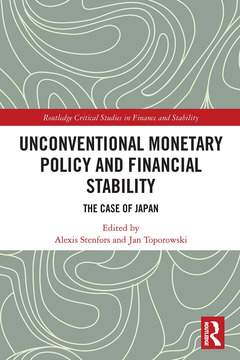Unconventional Monetary Policy and Financial Stability The Case of Japan Routledge Critical Studies in Finance and Stability Series
Coordonnateurs : Stenfors Alexis, Toporowski Jan

Since the financial crisis of 2008-09, central bankers around the world have been forced to abandon conventional monetary policy tools in favour of unconventional policies such as quantitative easing, forward guidance, lowering the interest rate paid on bank reserves into negative territory, and pushing up prices of government bonds. Having faced a crisis in its banking sector nearly a decade earlier, Japan was a pioneer in the use of many of these tools.
Unconventional Monetary Policy and Financial Stability critically assesses the measures used by Japan and examines what they have meant for the theory and practice of economic policy. The book shows how in practice unconventional monetary policy has worked through its impact on the financial markets. The text aims to generate an understanding of why such measures were introduced and how the Japanese system has subsequently changed regarding aspects such as governance and corporate balance sheets. It provides a comprehensive study of developments in Japanese money markets with the intent to understand the impact of policy on the debt structures that appear to have caused Japan?s deflation. The topics covered range from central bank communication and policymaking to international financial markets and bank balance sheets.
This text is of great interest to students and scholars of banking, international finance, financial markets, political economy, and the Japanese economy.
Preface. Introduction (1) The Japan Premium and the first stage of the monetary transmission mechanism (2) The foreign currency swap market: A perspective from policymakers (3) The effectiveness of unconventional monetary policy on Japanese bank lending (4) Japanese banks in the international money markets (5) The Japanese balance sheet recession 20 Years on: Abenomics – economic revival or corporate financialisation? (6) An analysis of the impact of the Bank of Japan’s monetary policy on Japanese government bonds’ low nominal yields (7) Unconventional monetary policy announcements and Japanese bank stocks (8) Bank of Japan and the ETF market (9) Quantitative and Qualitative Monetary Easing, negative interest rates and the stability of the financial system in Japan
Alexis Stenfors is Senior Lecturer in Economics and Finance at the University of Portsmouth, UK.
Jan Toporowski is Professor of Economics and Finance at SOAS University of London, UK.
Date de parution : 04-2022
15.6x23.4 cm
Date de parution : 07-2020
15.6x23.4 cm
Thèmes d’Unconventional Monetary Policy and Financial Stability :
Mots-clés :
Unconventional Monetary Policy; Federal Reserve; quantitative easing; Foreign Exchange Swap; alternative finance; Monetary Transmission Mechanism; heterodox macroeconomics; FX Swap Market; central banking; ETF Market; Japanese economy; NIRP; monetary policy; Bank Lending Channel; financial policy; Large Scale Asset Purchases; banking crisis; Japanese Banking Crisis; economic policy; JGB Yield; international finance; CIP; financial markets; Current Account Balance; Bank Stock Returns; unconventional monetary policies; Balance Sheet Recession; Japan's monetary transmission mechanism; Forward Guidance; global financial crisis; Interest Rate Channel; Japanese Banking; Unconventional Monetary Policy Measures; Money Market Instruments; EGARCH Model; Short Term Interest Rate; CDS Spread; Government Debt Ratios; Long Term Interest Rate



